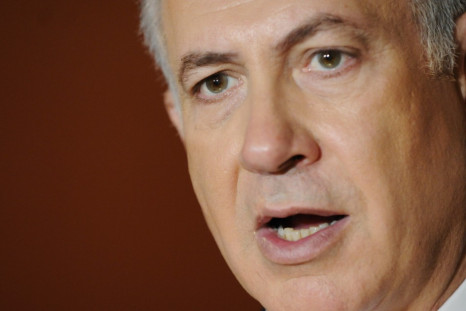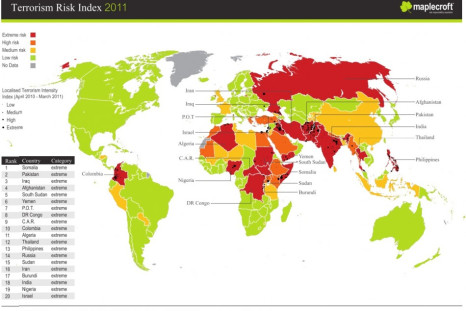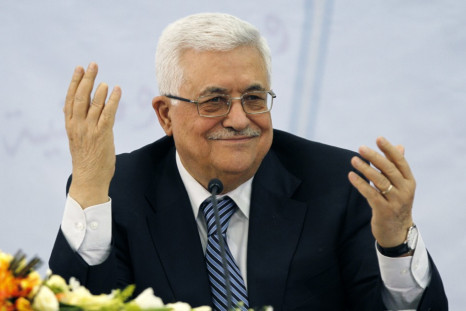Home
> Israel
Israel
Tensions Rise As Israeli Jets Bomb Gaza Targets
Violence and tensions between Israel and Palestinian militants are taking an alarming turn after Gaza militants launched barrages of rockets into Israel, while Israeli aircraft struck targets in the territory.
Palestinian Unity Deal: Already in the Past?
Hopes for a untied Palestinian leadership were recently reignited after a surprise agreement was signed just a few months ago, but recent events prove dissentions are still very much in the way.
Assad’s “Attack” on Palestinian Refugees : A History of Oppression ?
Assad’s “Attack” on Palestinian Refugees : A History of Oppression ?
Israel’s Settlement Policies Risk Frustrating Its Allies
Following Israel's announcement that the government had approved the construction of more settlers' homes in east Jerusalem, EU foreign policy chief Catherine Ashton on Friday expressed her "deep regret" over Israel's latest move.
Israel: Stock Market Plunges as Protests Continue
The first day of the trading week in the Middle East did prove that the economic crisis, is clearly affecting the region as stock markets in Dubai and Egypt dropped about four per cent, while in Israel the market plunged by seven per cent, which analysts say is a consequence of the downgrade of the debt rating in the U.S.
Israel: Activists Launch New Mass Protests Appeal
Despite Prime Minister Benjamin Netanyahu announcing this week he agreed to meet up with some of the protesters to talk about their demands in more depth, protests against the rising cost of food, educations, the rise of taxes and the increasing gap between the rich and the poor.
UK Top Of Major Western Economies At Risk Of Terrorism
The UK is at the greatest risk of terrorism of any Western economy, according to research.
Israel Denies Responsibility After Scandal Pushes Gay Irish Presidential Candidate to Withdraw
Israel has dismissed suggestion that it publicised a controversial letter which ended the Presidential campaign of Senator David Norris.
Israel: Is Netanyahu ‘Bowing Down’ Under Pressure?
The Independent reported that according to an Israeli television channel, Israeli Prime Minister Benjamin Netanyahu is prepared to base talks for a Palestinian state on the 1967 truce lines.
Israel Protests: Has Israel Been Hit by the Arab Spring?
As Israel's Prime Minister Benjamin Netanyahu is facing the strongest wave of protests since he took office, he was forced to announce that members of his government would meet protesters to try and calm public discontent.In the last two weeks, tens of thousands of Israelis have taken to the streets to demonstrate against the rising living costs, putting pressure on Netanyahu and asking for reforms.
Palestinian Statehood Bid: A Contentious Issue For the International Community?
Since Palestinian leaders have announced they will launch a Palestinian statehood bid in September at the United Nations Security Council, governments from all around the world have reacted to the decision, sometimes in a surprisingly passionate manner.
Hamas executions: Will killing its Own People Bring Peace and Statehood Any Closer?
Gaza's Hamas government Tuesday executed a Palestinian father and son convicted of spying for Israel in defiance of President Mahmoud Abbas, who by law has final say in implementing such rulings.
With the US rejecting the bid, will the UN recognise the Palestinian state?
An Arab League decision to ask the UN to recognize a Palestinian state along the pre-1967 lines would not serve the peace process, the US said on Thursday.
Israeli-Palestinian Conflict Could Become “Dangerous”: Blair
The Arab League will submit to the United Nations a request for recognition of a Palestinian state, Secretary General Nabil al-Arabi said on Thursday in Doha.The Arab peace initiative committee "has decided to submit a call to the member states of the United Nations to recognise a Palestinian state," Arabi told a news conference after a meeting of the committee in the Qatari capital, the AFP reported.It would "move to present a request for full membership of a Palestinian state ...
Hillary Clinton’s Global Tour Kicks off with Gaddafi
The situation in Libya will be the first item on U.S. Secretary of State Hillary Rodham Clinton's packed agenda during her latest around-the-world diplomatic tour, it appears.
Is Netanyahu Losing Support in Israel?
The Israeli parliament has passed a controversial law that will punish any Israeli individual or organisation boycotting West Bank settlements.
Israeli soldiers kill 21 year old Palestinian
Israeli soldiers Wednesday killed a young Palestinian man while looking for an activist of the Islamic Jihad Movement at a refugee camp in the West Bank's north, Palestinian security sources told the Associated Press.
Cyprus: Investigators have ruled out sabotage, government says
Dozens of containers of gunpowder seized from an Iranian cargo ship in 2009 exploded on Cyprus' main naval base Monday in a massive blast that killed 12 people, wounded 62 and wrecked a major power station, causing extensive blackouts.
Israel: “Flytilla” activists threaten to go on hunger strike as they insist there is no ground for detention
our female activists from Wales detained as they entered Israel to visit the West Bank town of Bethlehem could be deported today.The women were detained as part of a so-called "flytilla" protest after they landed at the country's Ben Gurion Airport along with eight other British nationals on Friday.
At least 112 dead in blasts at Cyprus naval base, seized Iranian weapons blamed
Huge blasts rocked the main Greek Cypriot naval base at Zygi in the south of the Mediterranean island early on Monday leaving 12 dead and many injured, a defence ministry spokeswoman said.
Israel, European Allies to Stop Pro-Palestinian 'Flytilla' Activists
Israeli police have confirmed that an estimated 200 pro-Palestinian activists were kept from boarding flights to Israel overnight and no incidents were reported at Ben-Gurion International Airport outside Tel Aviv, Israel police said yesterday.
South African watchdog rules that Israel can be called “an apartheid state”
On July 5 the South African media watchdog, the Advertising Standards Authority (ASA), unequivocally dismissed all complaints relating to a radio advert on 5fm that called for the boycott of Israel and compared Israel to Apartheid South Africa.
Israel gears for pro-Palestinian fly-in
The Israeli Government has warned it is determined to prevent provocations at Ben Gurion Airport as some 500 activists are expected to land in Israel in coming days.Despite the Israeli government's warning, they maintain their aim is to visit Bethlehem and allow visitors into Palestinian villages where entry is restricted.
Pro-Palestinian airport protest: “These hooligans will not be allowed into the country”, Israel Public Minster says
Israel's Public Security minister Yitzhak Aharonovitch on Tuesday slammed the hundreds of pro-Palestinian activists who plan to flood Tel Aviv's Ben Gurion airport this week as "hooligans" who would be barred entry.
4th of July: Twitter goes gaga on Independence Day
People around the world are writing Happy Independence Day messages to their Twitter friends in the United States and abroad. It seems that this year, the world is backing the U.S all the way as even the most secular today wrote "God bless America."
Did social networks like Facebook and Twitter really influence the Arab Spring?
After years of repression, intimidation and exploitation, regimes in the Middle East and North Africa became aware they risked being forced out by the people they oppressed.
Arab newpspaper claims Israel threatens to assassinate Syria leader Bashar Assad if war launched
Israel sent a message to Syrian President Bashar Assad in recent days, warning him that if he started a war with the Jewish state in order to divert attention from domestic problems, Israel will target him personally, Kuwaiti newspaper Al-Jarida reported on Tuesday.
Banned ‘anti-Semitic’ Islamist leader Raed Salah arrested in London hours before attending parliament
The head of the northern branch of the Islamic Movement in Israel, Sheikh Raed Salah, was arrested in London on Tuesday evening. He spent the night in a prison cell, and is expected to be deported from the U.K.
U.S. Human Trafficking report: From America to Africa, Europe, China and the Middle East: Why does slavery still exist?
For the second time in the report's 10-year history, the United States is included in the State Department's annual report on human trafficking.
Flotilla activists planning to kill Israeli soldiers, just propaganda?
Israeli army sources told the Jerusalem Post on Monday night that new intelligence information obtained in recent days shows that participants of the flotilla planning to break Israel's sea blockade over the Gaza Strip later this week plan to kill Israeli Defence Forces soldiers who board their ships.























